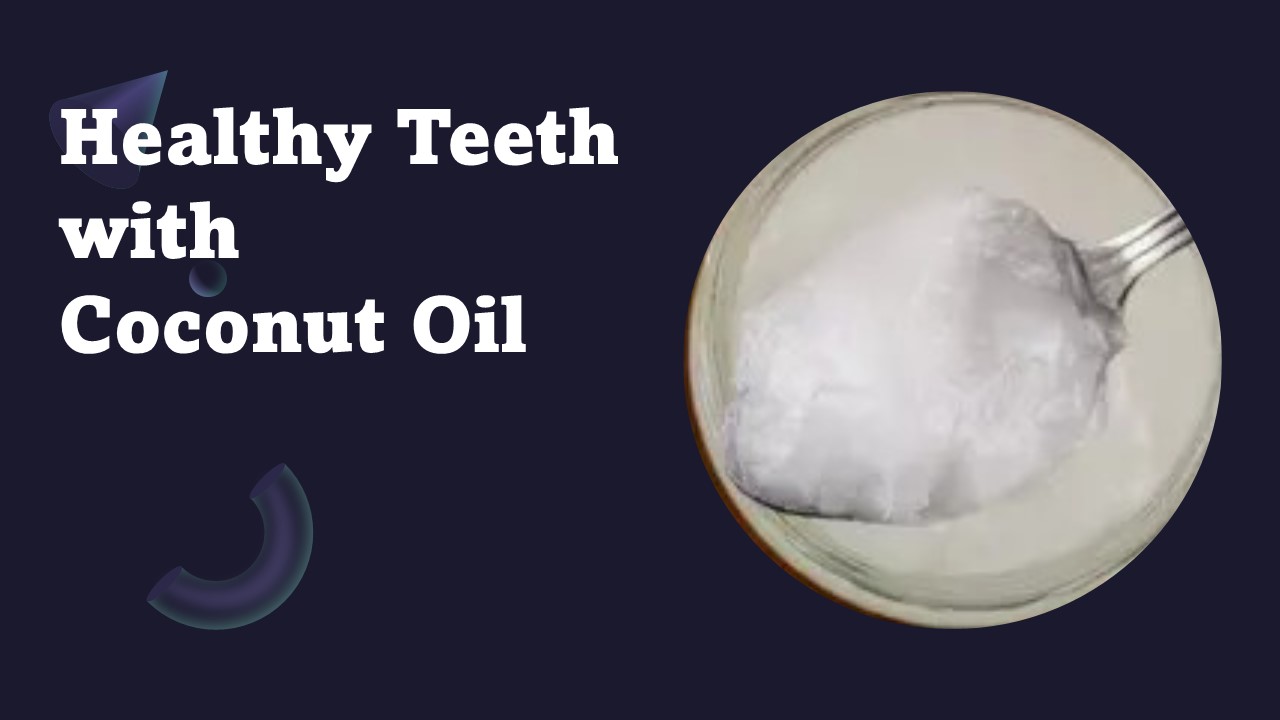
Attempts to whiten teeth with coconut oil have gone viral recently. While there may not be conclusive evidence that these methods effectively whiten teeth, they do offer significant benefits for our teeth, gums, saliva, decay prevention, and oral hygiene. Studies have shown that coconut oil effectively prevents the production of germs and plaque, but there is no scientific data that adequately supports its effects on teeth whitening.
In a 2015 scientific study, the effects of coconut oil on teeth and oral hygiene were monitored. In this study, 60 people were observed for a month, and the results seem to encourage you to use coconut oil. At the very least, it will be much more effective to rely on such scientific studies rather than relying on YouTube videos. Here are the results.
- Coconut oil pulling is an effective method to reduce plaque formation and plaque-induced gingivitis.
- Coconut oil is a safe, easy to apply and economical method.
- Its anti-inflammatory and antimicrobial properties are effective in reducing gingivitis.
Oil pulling mechanism:
Saponification effect:
The role of lauric acid:

The scientific article also highlights the importance of incorporating oil pulling with coconut oil into daily routines to enhance oral hygiene and decrease plaque formation.
How Does Coconut Oil Whiten Teeth Naturally?
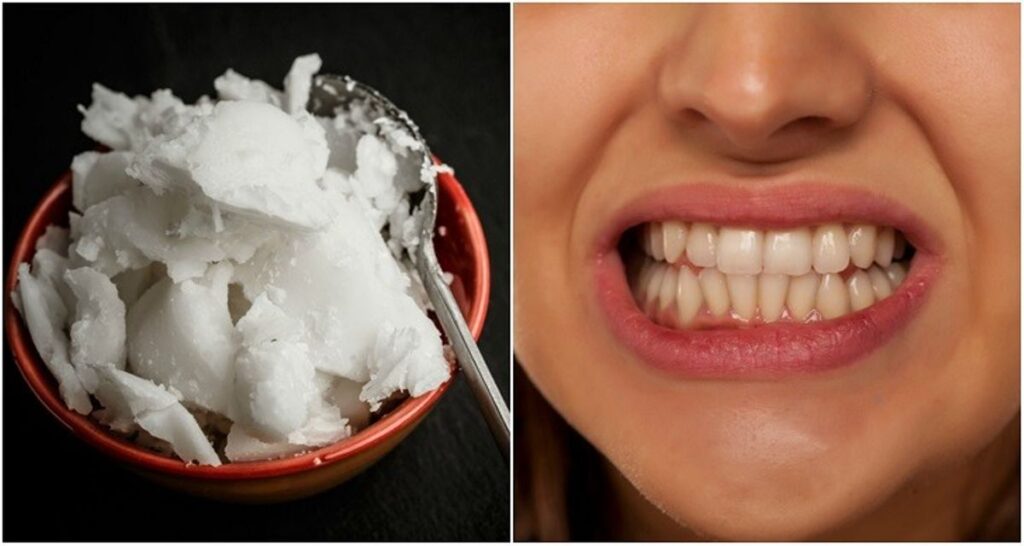
The whitening of teeth with coconut oil is based on the fact that lauric acid dissolves plaque and bacteria and strengthens the enamel. Plaque, bacteria, and enamel thinning are all potential causes of yellow teeth. Coconut oil contains lauric acid, which helps to enhance the tooth enamel by removing plaque and bacteria. This starts a natural whitening process in the teeth.
To apply, you need to swish a tablespoon of coconut oil in your mouth for 15 minutes and repeat at least once a day. During this period, the oil adheres to the oral bacteria and facilitates their elimination. Moreover, swishing oil in the mouth enhances the luster and appearance of teeth.
The Benefits of Using Coconut Oil for Teeth Whitening
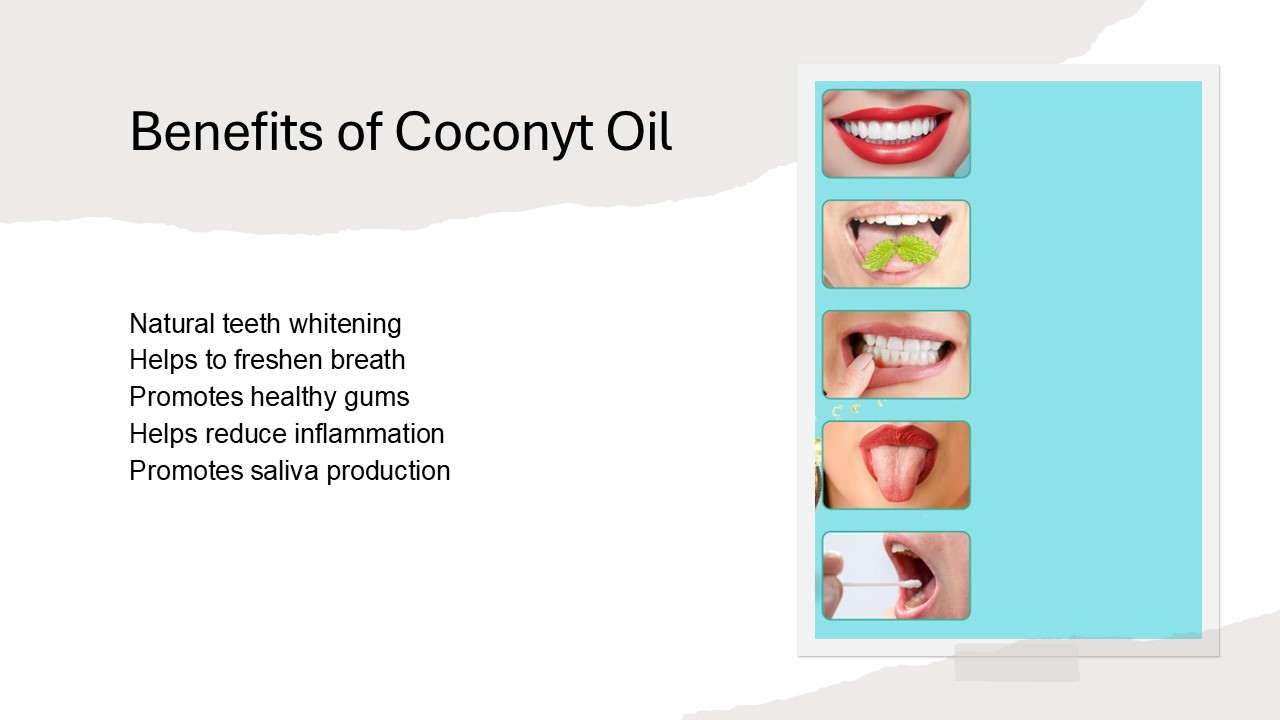
Oil pulling is a morning ritual that has been practiced in Ayurveda for thousands of years. In ancient Ayurvedic texts dating back two thousand years, it is documented that 30 diseases were treated with this method. Its application in the west only began in the 90s with the introduction of a Russian doctor.
Therefore, how can we reap the benefits of oil pulling with coconut oil? The health of our gums and teeth benefit greatly from it. The antimicrobial action is felt in the mouth. An effective way to kill bacteria is to rinse your mouth with oil for 20 minutes. This will allow the oil to reach all corners of your mouth and neutralize any bacteria that may be there. The beneficial effects of this detox extend beyond the mouth and into the rest of the body, alleviating multiple diseases. One study found that tugging on coconut oil alleviated symptoms of a variety of illnesses, including acne, migraines, headaches, and arthritis.
Antibacterial Properties of Coconut Oil for Oral Health
Because of its antimicrobial characteristics, coconut oil is useful in combating the germs that cause gum disease and tooth decay. Because it contains lauric acid, it inhibits the growth of plaque-causing bacteria like Streptococcus mutans. Additionally, it has the potential to prevent the growth of oral infections-causing fungus like Candida albicans. Thus, oil pulling using coconut oil can be seen as a viable option for enhancing dental hygiene and sustaining gum health. You can avoid gum disease and other oral illnesses by using it regularly.
How Often Should You Use Coconut Oil for Teeth Whitening?
Oil pulling with coconut oil is a wonderful practice to incorporate into your daily routine! Aim to do it once a day for 15-20 minutes, ideally in the morning on an empty stomach. Rinse the oil in your mouth for about 15 minutes, then spit it out! With regular application, this method can significantly help in reducing plaque and stains on the teeth. For great results, applying it at least 3-4 times a week is a wonderful idea! It's great to know that applying it every day can contribute to maintaining tooth and gum health!
Top Benefits of Coconut Oil for Dental Health
Coconut oil does not directly influence teeth whitening. Nonetheless, it offers significant advantages for dental health by strengthening tooth enamel, tightening gums, and removing bacterial infections. Here are many of these advantages:
- Helps reduce plaque and gingivitis; Scientific studies show that 20 minutes of oil pulling with coconut oil accelerates the dissolution of bacteria due to the mechanical effect of the oil.
- Prevents gum disease; Coconut oil, especially when used with turmeric, the curcumin in turmeric acts as a powerful antioxidant, neutralizing free radicals in the body. This helps prevent cell damage.
- It also improves the brightness of teeth.
- The antioxidant and antibacterial properties of coconut oil contribute to keeping teeth healthy by cleaning harmful bacteria in the mouth.
How Coconut Oil Improves Gum Health

When you provide your gums with the appropriate environment and conditions, that is, as long as you keep your mouth clean and well-groomed, your gums will renew themselves. Coconut oil will also play a very useful role in this renewal process. There are four layers in our gums. While the bottom layer of these layers is constantly producing cells, the top layer is constantly removing dead cells. In our gums, cell renewal and removal of old cells is a continuous process.
Also, gums have an active and invasive structure. However, they tend to retreat when they encounter a diseased area, while they tend to invade a clean area. Especially when a disease such as periodontitis occurs, the cells at the very ends of the gums can lose their ability to regenerate due to the acids and various factors secreted by the bacteria on the tartar. When our gums can no longer heal on their own, our immune system usually pulls them back.
Coconut Oil Helps Gums Regenerate Themselves
As a protective mechanism, our gums move away from infected areas and toward healthier ones. The gums are intrusive, therefore the bacterial structure secretes more and more all the time in an effort to soak up the gums and disintegrate them.
Coconut oil and other oil pulling methods work by mechanically dissolving plaque and bacteria in the mouth as you rinse them away during this intense oral combat. Furthermore, these techniques encourage the renewal of cells. Its anti-inflammatory properties also make it useful for reducing gum swelling and stopping bleeding.
Coconut Oil in Oral Hygiene: Antibacterial Effects Explained
Coconut oil is a natural alternative to chemical mouthwashes that are safe to use and have no negative side effects. According to a 2015 scientific article on the antibacterial properties of coconut oil, the alkaline substances in saliva, such as sodium hydroxide, react with the oil in the mouth to produce soap-like substances. These substances then make it harder for plaque and bacteria to stick to tooth surfaces.
Since the process of cleaning and contamination in our mouths is an ongoing cycle, it is highly advantageous to use coconut oil for oral hygiene since it inhibits the bacteria's ability to adhere to salivary proteins for an extended period of time. So, it does double duty as a cleaner and a protector for a set amount of time. But depending on what we consume, our mouths start to grow dirty right after regular dental care.
Natural Coconut Oil and Turmeric Toothpaste Recipe
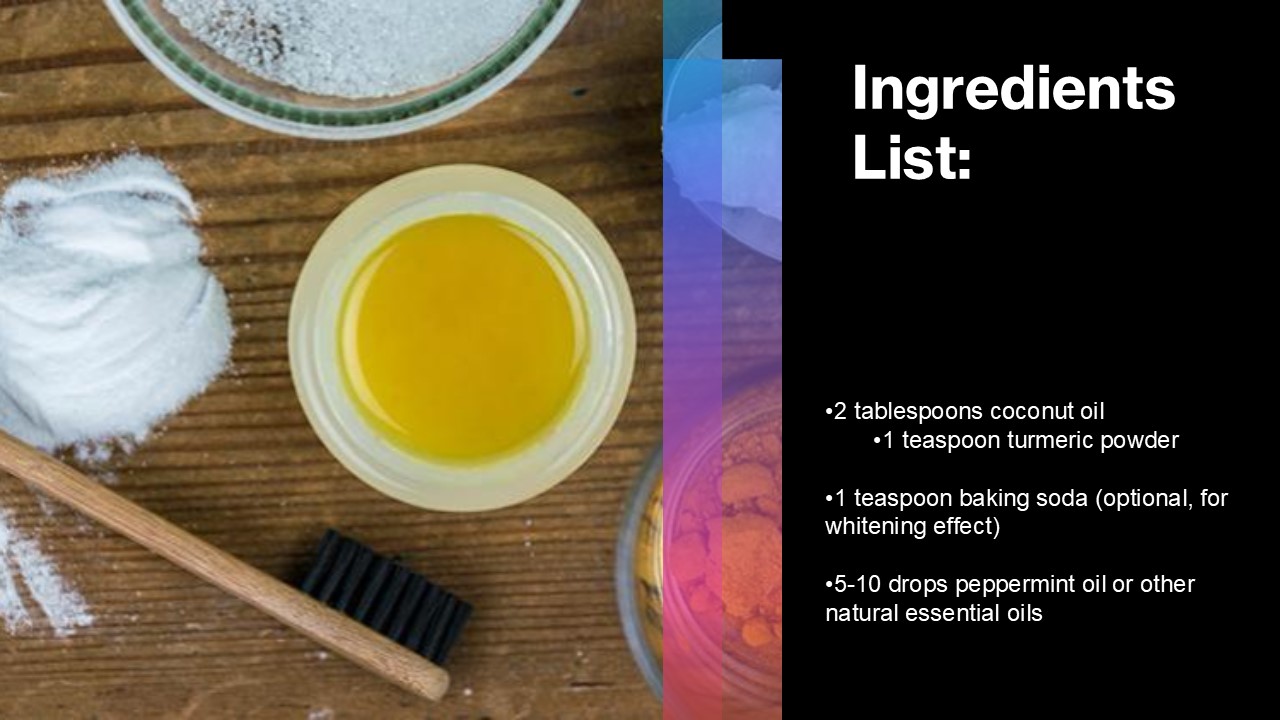
Here are two toothpastes that include coconut oil as an ingredient. They are quite simple to make and are effective methods.
Recipe 1
Ingredients:
- 2 tablespoons coconut oil
- 1 teaspoon turmeric powder
- 1 teaspoon of baking soda (Baking soda can wear down teeth enamel, so be careful. On the other hand, baking soda's abrasive properties will be useful for stubborn plaque. Hence, you should only use baking soda for a specific amount of time.)
- 5-10 drops of peppermint oil or other natural essential oils (for flavoring, optional)
Preparation:
- Prepare the Coconut Oil: Soften the coconut oil by heating it slightly. It can also be used at room temperature.
- Make the Mixture: Add turmeric powder to the softened coconut oil and mix well.
- Add Additional Ingredients: Add baking soda and optional essential oils such as peppermint oil. Stir until you get a homogeneous mixture.
- Storage: Transfer the mixture into a clean and dry jar. Store at room temperature.
- Usage: Take a little mixture on your toothbrush and use it like normal toothpaste.
Recipe-2
Ingredients:
- 1 teaspoon coconut oil
- Half a teaspoon of baking soda
- Quarter teaspoon food grade hydrogen peroxide (3%)
- 3 drops of essential oil (For example, clove, cinnamon or thyme oil)
Preparation:
- Take one teaspoon of coconut oil.
- Add half a teaspoon of baking soda to the coconut oil.
- Add a quarter teaspoon of food grade hydrogen peroxide (3%). Do not use 35% hydrogen peroxide. (Hydrogen peroxide is a whitening agent used in all professional and DIY whitening products. You can add hydrogen peroxide to the mixture if your teeth have become excessively yellow. After you whiten your teeth, we advise against using baking soda and hydrogen peroxide in any recipes you may have. For the simple reason that prolonged use can wear down tooth enamel.)
- Add one of three drops of essential oil. For example
- Clove Oil
- Cinnamon Oil
- Thyme Oil
Add Coconut Oil:
Add the baking soda:
Add Hydrogen Peroxide:
Add Essential Oil:
Important note: essential oils have a pizza-like aroma but are actually great for your teeth. Thoroughly combine all the ingredients until they form a uniform mixture. Be sure to keep the toothpaste in a dry and clean place. Put a little of the mixture on your toothbrush and brush as you would with regular toothpaste.
Related: 14 Tips to Get Rid of Yellow Teeth
Combining Coconut Oil and Turmeric for Enhanced Teeth Whitening
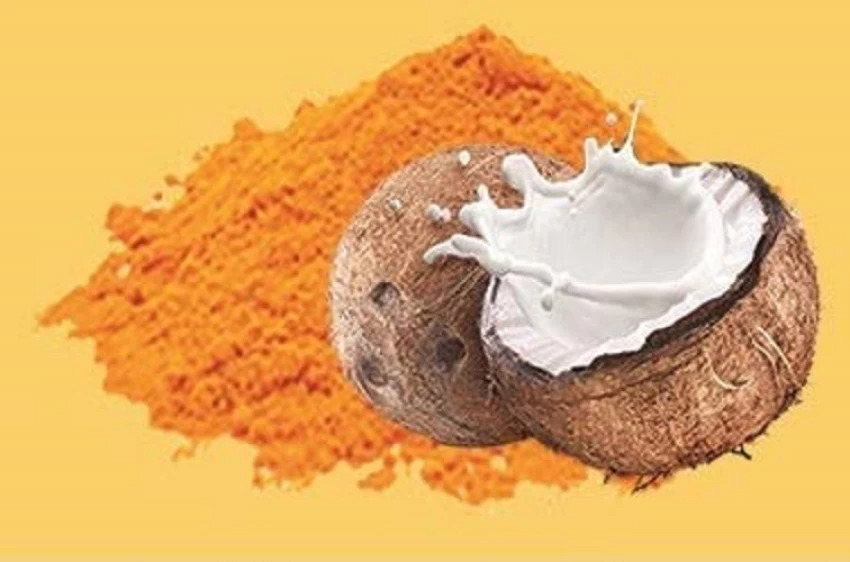
The anti-inflammatory and astringent qualities of turmeric make it a popular ingredient in beauty products. Here you can see for a scholarly article discussing turmeric's positive effects on general and oral health:
- Curcumin reduces inflammation by suppressing prostaglandin production and neutrophil function.
- Turmeric-based mouthwashes and pastes are effective in reducing gingivitis.
- Paste made with a mixture of turmeric and salt strengthens teeth and gums.
- Gels containing 2% turmeric have been used as an effective auxiliary method in the treatment of gum diseases.
- As a natural antiseptic and antibacterial agent, it is said to be effective in disinfecting wounds.
Because of these characteristics, combining turmeric with coconut oil oil makes it an even more potent instrument in the fight against tooth decay. Furthermore, these applications are highly beneficial to health and do not cause harm as they do not involve consumption.
When is the best time of day to whiten teeth with coconut oil?
Coconut oil oil pulling could be best done first thing in the morning for certain people. If you want to get rid of the plaque and germs that developed in your mouth while you slept, the oil pulling technique is best done right after you get up.
As you get ready for the day, whether it's applying makeup or making breakfast, take a few minutes to swish some coconut oil around your mouth. It has a strange flavor that won't appeal to you at first, but you'll grow to love it as time goes on. Once you've applied it, spit it into a bag. Avoid doing this in the sink. Fatty buildup, when exposed to cold temperatures, can freeze and block pipes in the kitchen sink.
Commercial Toothpastes or Homemade Formulas Like Coconut Oil
First of all, it is useful to know that both methods aim at cleaning the teeth and oral hygiene. The aim of these methods is not to make the teeth look whiter. Therefore, it is not correct to evaluate these methods in terms of their teeth whitening effects.
Although commercial toothpastes contain beneficial ingredients such as fluoride, which provides effective protection against tooth decay, they also contain many harmful chemicals. Fluoride can harm both good and bad bacteria, while triclosan can cause endocrine disruption, particularly in saliva, and is banned in some countries.
Foaming agents such as Sodium Lauryl Sulfate (SLS) can negatively affect the oral microbiome and salivary chemistry. In addition, ingredients such as propylene glycol, artificial flavors and colors, parabens, and carrageenan can damage the salivary microbiota and reduce the cleaning effect of saliva on teeth.
On the flip side, natural toothpastes contain abrasive ingredients like baking soda and hydrogen peroxide, which can wear down tooth enamel. However, you can manage their use to remove them if needed. On the other hand, you'll need to put in more work and time to prepare and use homemade approaches. Because of this, it may be challenging to include them in our regular regimen.
Conclusion
Research has demonstrated several benefits of the coconut oil pulling technique. Additionally, numerous user experiences corroborate these findings. Importantly, there is no detriment in attempting these strategies. Nevertheless, it would be inaccurate to assume that what is effective for one person will necessarily be effective for oneself.
This is because numerous factors affect the efficacy of these techniques, including genetic predispositions, bacterial and plaque levels in the oral cavity, and the pH of the mouth. If you are young and your plaque has been present for only a few years, for example, these procedures may produce more rapid results.
Professional Whitening and Maintenance at Antlara Dental
At Antlara Dental, we propose initially whitening the teeth using a professional approach, followed by maintaining dental health with these natural techniques. The teeth undergo mechanical cleaning prior to the professional whitening procedure. Subsequently, hydrogen peroxide agents that infiltrate the dentin prove efficacious in whitening teeth while simultaneously cleansing cavities and eradicating microorganisms.
However, the continual cycle of contamination and cleaning in the mouth makes coconut oil a great choice. So, to get and stay in the best possible dental health, it's best to combine expert treatments with natural ways.
